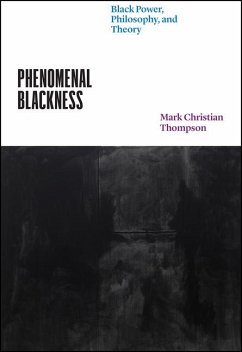"Phenomenal Blackness examines the changing interdisciplinary investments of key mid-century African American writers and thinkers, showing how their investments in sociology and anthropology gave way to a growing interest in German philosophy and critical theory by the 1960s. Thompson analyzes this shift in intellectual focus across the post-war decades, pinpointing its clearest expression in Amiri Baraka's writings on jazz and blues, in which he insisted on philosophy as the critical means by which to grasp African American expressive culture. More sociologically oriented thinkers, such as W. E. B. Du Bois, had understood blackness as a singular set of socio-historical characteristics. In contrast, writers such as Baraka, James Baldwin, Angela Y. Davis, Eldridge Cleaver, and Malcolm X were variously drawn to notions of an African essence, an ontology of Black being. For them, the work of Adorno, Habermas, Marcuse, and German thinkers was a vital resource, allowing for continued cultural-materialist analysis while accommodating the hermeneutical aspects of African American religious thought. Mark Christian Thompson argues that these efforts to reimagine Black singularity led to a phenomenological understanding of blackness--a "Black aesthetic dimension" wherein aspirational models for Black liberation might emerge"--
Hinweis: Dieser Artikel kann nur an eine deutsche Lieferadresse ausgeliefert werden.
Hinweis: Dieser Artikel kann nur an eine deutsche Lieferadresse ausgeliefert werden.








